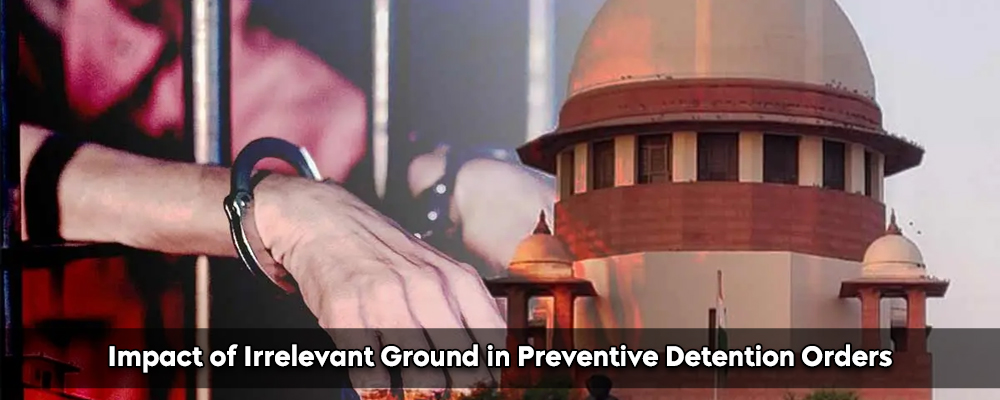Authorities use preventative detention as an instrument to uphold constitutional principles, preserve national security, and head off possible threats. Having the power to hold someone without a trial or charge must be exercised carefully and scrupulously in order to comply with the law. Preventive orders for detention should be backed up by legitimate and valid grounds, based on one of the main principles. Such orders can become illegal and infringe on individual rights if irrelevant grounds are incorporated.
Preventive Detention: Meaning and Purpose
- Significant procedural protections are offered with regard to preventative detention under the virtue of Article 22 of the Constitution of India.
- Meaning and Purpose Detention without a court trial or judgment is commonly referred to as preventive detention. The purpose is to deter someone from committing an offense in the not-too-distant future rather than to punish them for a prior offense.
- Unless a committee of experts finds adequate reasons for a longer detention period, a person’s imprisonment cannot last longer than three months.
Need A Legal Advice
The internet is not a lawyer and neither are you. Talk to a real lawyer about your legal issue

Preventive Detention: Grounds for the Order
The significant and relevant grounds for the order for preventive detention are as follows-
- Protection of the state and preservation of the law
- Preservation of supplies, defense, and essential services
- Foreign policy or India’s security.
Only one or more of the grounds mentioned above may be used to hold someone without trial. A person held in preventative detention has no right to utilize any of their rights for personal liberty under Article 19 or 21 of the Constitution.
Major Impacts of Irrelevant Grounds: Preventive Detention
- The fundamental rights of individuals, which include the right to liberty and the right to due process, are violated when they are detained on irrelevant grounds. It contradicts the rule that says restrictions on personal freedoms must be reasonable and essential.
- When citizens think of preventive detention as an instrument for harassment rather than security, public confidence in both government and law enforcement agencies may decline. This could lead to protests and make it more challenging for the governing body to protect itself from real threats.
- It may be deemed an abuse of authority by the government to include irrelevant grounds in a detaining order. It empowers authorities to target people without a legitimate reason, damaging the system of justice’s credibility and integrity.
- If detainees are able to show that irrelevant grounds served as a significant reason for their confinement, they can appeal their imprisonment in court. This ends up resulting in complicated legal issues, expensive litigation, and perhaps reputational damage for the government.
Role of the Judiciary: Jammu and Kashmir High Court
- In the case of Zubair Ahmad Khan v Union Territory of J&K, the petitioner, Zubair Ahmad Khan, was held against the Public Safety Act of 1978 in order to stop him from carrying out actions that would threaten the security of the state.
- The J&K High Court came to its opinion that the grounds for detention were irrelevant and vague after weighing the arguments put up by both parties and lacking references to certain days, weeks, or years regarding the petitioner’s claimed acts.
- Judgment The Court emphasized that incorporating an illogical or irrelevant ground along with other pertinent ones undermines the detainee’s fundamental rights and entitles them to petition the Court for remedy. The detention order becomes invalid if even one of the grounds or reasons leading to the detaining authority’s subjective satisfaction is untrue, erroneous, or irrelevant.
A powerful instrument that is capable of preserving law and order and safeguarding national security is preventive detention. However, it must be employed with great caution and in complete compliance with the constitutionality, necessity, and fairness standards. Not only do irrelevant grounds for jail time violate the freedoms of individuals, but they additionally jeopardize the system of justice’s legitimacy as well as undermine public trust.
When using preventive detention for the sake of the state and its citizens, governments as well as judicial systems worldwide must continue to be vigilant in representing the rule of law.
One can talk to lawyer from Lead India for any kind of legal support. In India, free legal advice online can be obtained at Lead India. Along with receiving free legal advice online, one can also ask questions to the experts online free through Lead India.





 Talk to a Lawyer
Talk to a Lawyer